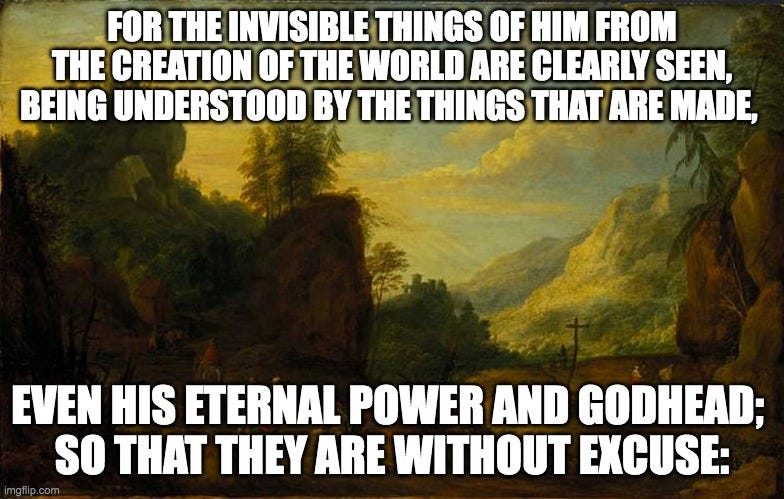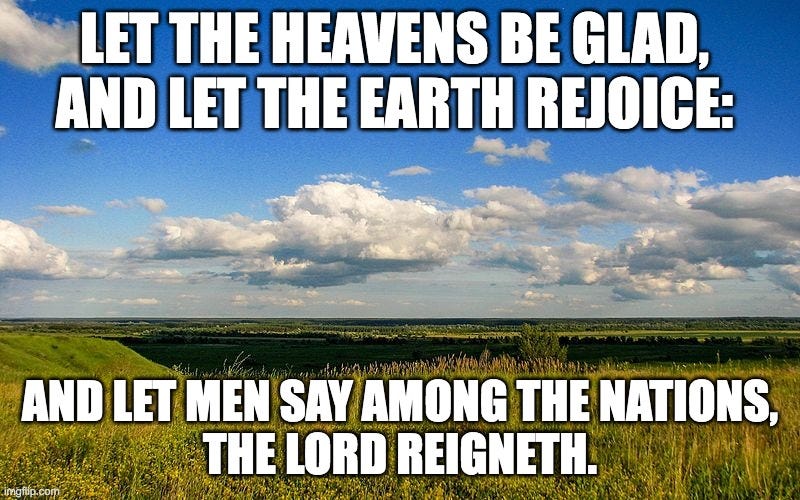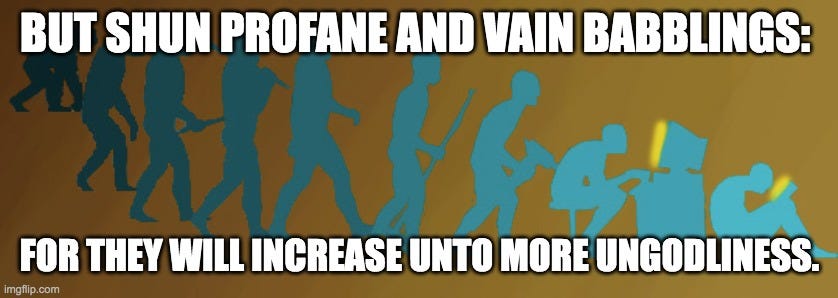One of my first journalistic adventures, or misadventures, concerned a comment on Grant Allen, who had written a book about the Evolution of the Idea of God. I happened to remark that it would be much more interesting if God wrote a book about the evolution of the idea of Grant Allen. And I remember that the editor objected to my remark on the ground that it was blasphemous; which naturally amused me not a little. For the joke of it was, of course, that it never occurred to him to notice the title of the book itself, which really was blasphemous; for it was, when translated into English, ‘I will show you how this nonsensical notion that there is a God grew up among men.’ My remark was strictly pious and proper; confessing the divine purpose even in its most seemingly dark or meaningless manifestations. In that hour I learned many things, including the fact that there is something purely acoustic in much of that agnostic sort of reverence. The editor had not seen the point, because in the title of the book the long word came at the beginning and the short word at the end; whereas in my comment the short word came at the beginning and gave him a sort of shock. I have noticed that if you put a word like God into the same sentence with a word like dog, these abrupt and angular words affect people like pistol-shots. Whether you say that God made the dog or the dog made God does not seem to matter; that is only one of the sterile disputations of the too subtle theologians. But so long as you begin with a long word like evolution the rest will roll harmlessly past; very probably the editor had not read the whole of the title, for it is rather a long title and he was rather a busy man.
But this little incident has always lingered in my mind as a sort of parable. Most modern histories of mankind begin with the word evolution, and with a rather wordy exposition of evolution, for much the same reason that operated in this case. There is something slow and soothing and gradual about the word and even about the idea. As a matter of fact, it is not, touching these primary things, a very practical word or a very profitable idea. Nobody can imagine how nothing could turn into something. Nobody can get an inch nearer to it by explaining how something could turn into something else. It is really far more logical to start by saying ‘In the beginning God created heaven and earth’ even if you only mean ‘In the beginning some unthinkable power began some unthinkable process.’ For God is by its nature a name of mystery, and nobody ever supposed that man could imagine how a world was created any more than he could create one. But evolution really is mistaken for explanation. It has the fatal quality of leaving on many minds the impression that they do understand it and everything else; just as many of them live under a sort of illusion that they have read the Origin of Species.
But this notion of something smooth and slow, like the ascent of a slope, is a great part of the illusion. It is an illogicality as well as an illusion; for slowness has really nothing to do with the question. An event is not any more intrinsically intelligible or unintelligible because of the pace at which it moves. For a man who does not believe in a miracle, a slow miracle would be just as incredible as a swift one. The Greek witch may have turned sailors to swine with a stroke of the wand. But to see a naval gentleman of our acquaintance looking a little more like a pig every day, till he ended with four trotters and a curly tail, would not be any more soothing. It might be rather more creepy and uncanny. The medieval wizard may have flown through the air from the top of a tower; but to see an old gentleman walking through the air, in a leisurely and lounging manner, would still seem to call for some explanation. Yet there runs through all the rationalistic treatment of history this curious and confused idea that difficulty is avoided, or even mystery eliminated, by dwelling on mere delay or on something dilatory in the processes of things. There will be something to be said upon particular examples elsewhere; the question here is the false atmosphere of facility and ease given by the mere suggestion of going slow; the sort of comfort that might be given to a nervous old woman travelling for the first time in a motor-car.
GK Chesterton, The Everlasting Man
I’ve been having a fascinating argument with Carl Allen. It began with a discussion of what he meant by ‘equivocation’, but it continued on until we reached a discussion of methodological naturalism, and the issue of what ‘evidence’ would be like in the creation vs evolution debate.
The quick answer is that there can be no evidence for or against creation or evolution in the sense that he means it. Once one has tied ‘science’ to ‘methodological naturalism’, then any question that goes between a spiritual and a natural explanation can have no evidence. Any statement about evolution should begin, “If there is no God…”.
Seeking Naturalistic Evidence for a Supernaturalistic Event
Carl kept asking me for ‘evidence’, seemingly unaware of the category error. What type of evidence was he looking for? Natural evidence? By definition a supernatural action does not leave natural evidence. That’s kind of the point. When Christ turned the water into wine… there was no winepress with telltale grapeskins to be investigated. When Virgin Mary conceived, no hidden camera would have revealed the identity of her secret lover.
The fascinating aspect of this is how so many atheists seem to see this as some sort of point on their side. “Where is your evidence?” they repeat. They are so wrapped up in their naturalistic world view that they miss the entire world outside of it.
Indeed they miss all of the things that their worldview cannot explain. Where is their evidence for ‘justice’, for example? How many experiments can one do to determine if capital punishment is more or less just than life in prison or thirty lashes?
Opening Choice
Another problem that the seeker for evidence has in this debate is that there is a choice that must be made in the beginning of the investigation that will change the entire face of the investigation. Do you believe that supernatural actors exist?
Obviously if you don’t, then you can’t even manage to see any supernatural evidence, no matter how obvious. And if you do, then your determination for where and how you see that intervening is up to the method you use for determining supernatural interventions.
Category Error
The very word ‘science’ tends to confuse people when discussing evolution. If evolution happened, it would take a historical inquiry to determine it, not a ‘scientific’ one. That is to say that ‘science’, when it is at home, is concerned with things that repeat. We heat water to a certain temperature, and we see if it boils. We adjust the pressure, and the salinity, record all of those things, and try again, and again.
But historical events are not so. We cannot set Ceasar on the battlefield again and again to see how he used his cavalry, and whether a few fewer swordsman will lose him the battle. The battle, won or lost, is in the past.
It is actually possible for absolutely every single bit of ‘evidence’ that is proposed for evolution to be absolutely true… and for the world to have been created, from nothing, ten minutes before this post goes live? Saying what could happen, or what is likely to happen given such and such circumstances, cannot ever tell us what did happen. The pair of two’s that the gambler got on the third hand might have been exactly within the odds of what a random draw would produce… and the dealer still might have been cheating.
When the Scriptures say, “In the beginning, God created the heavens and the Earth…” that is a statement of history. And theology. To challenge it one has to do a historical study, not a ‘scientific’ one. And a theological study.
Smith or Jones
I think that perhaps the biggest error that the seeker for evidence faces is the fact that he forgets that he is supposed to be looking for evidence that Smith is more likely than Jones to have murdered Lord Ballworth in the library with an inkstand. They focus so much on the fact that Lord Ballworth was murdered, or that Smith hated him, that they forget that is quite possible that Jones, too, hated him.
In order to have evidence for evolution one would need to:
Make a guess of what the world would have been like if evolution had been true and
Make a guess of what the world would have been like if creation had been true
But, then, all you are doing is comparing your guesses. And so the whole exercise revolves around how good a guesser you are. And guessing what the world would have been like with special creation involves… theology.
Conclusion
"The extraordinary lack of evidence to show that the incidence of death under natural conditions is controlled by small differences of the kind which separate species from one another or, what is the same thing from an observational point of view, by physiological differences correlated with such structural features, renders it difficult to appeal to natural selection as the main or indeed an important factor in bringing about the evolutionary changes which we know to have occurred.It may be important, it may indeed be the principle which overrides all others ; but at present its real existence as a phenomenon rests on an extremely slender basis. The extreme difficulty of obtaining the necessary data for any quantitative estimation of the efficiency of natural selection makes it seem probable that this theory will be re-established, if it be so, by the collapse of alternative explanations which are more easily attacked by observation and experiment.If so, it will present a parallel to the Theory of Evolution itself, a theory universally accepted, not because it can be proved by logically coherent evidence to be true, but because the only alternative, Special Creation [the doctrine that the universe and all life in it originated by divine decree], is clearly incredible."D.M.S. Watson, "Adaptation," Nature, Vol. 124, 10 August 1929, p. 233.
My own guess is that this post won’t make a lick of difference. Because the evolution/creation debate is settled before anyone comes to the debate table. No one actually sits down and says, “I’m undecided as to whether there is an omnipotent God capable of creating the entire world ex nihlo, or whether we are all the products of blind chance.” Our view of God is a priori to, not a posteri to, our view of creation and evolution.
If there is no God. If there are not supernatural creative forces, then evolution is not the best game in town, it is pretty much the only game in town. Everything that you see in biology or palaeontology or even physics will become evidence for evolution, because you already know that that is what happened… you are just working out how. The various exponents of evolution can have great arguments, indeed can even (and frequently do) call each other’s contradictory theories utterly impossible. But they still believe in evolution, because they must. Because the only alternative is God.
Afterward
I’m calling this an Afterward because it came afterwards. After I had written this post, but before it published, I had a long, fascinating, and very revealing conversation with J. Daniel. We did not talk about monogamy, but creation. Not even really about evolution, just creation.
Creation and theology. The conversation ran the theological gamut, with the major focus being what was theology. What did theology cover.
The really interesting part of the thread began when he said:
“How does nature work?” is not a theological inquiry.
“Where did nature come from?” has a theological angle.
There is a vast gulf between these two questions.And ended (so far) with his saying:
But no, I was not reasoning in that fashion. “God would X” is the kind of speculation theologians do. The question is whether the claims and necessary implications of the story are both internally consistent and are not verifiable untrue by checking against other available information. Christianity fails on both counts UNLESS one does a series of special pleadings that, if applied to other religions, would equally well smooth out their problems.Now, that last is fascinating on so many levels. So many interesting… theological levels. It isn’t turtles all the way down, but its definitely theology all the way down. The nature of the kind of world a certain kind of God would create. Just ‘internally consistent’ has echoes of Greg Bahnsen.
I recommend reading the whole exchange. Several times.
Thank you for reading Von’s Substack. I would love it if you commented! I love hearing from readers, especially critical comments. I would love to start more letter exchanges, so if there’s a subject you’re interested in, get writing and tag me!
Being ‘restacked’ and mentioned in ‘notes’ is very important for lesser-known stacks so… feel free! I’m semi-retired and write as a ministry (and for fun) so you don’t need to feel guilty you aren’t paying for anything, but if you enjoy my writing (even if you dramatically disagree with it), then restack, please! Or mention me in one of your own posts.
If I don’t write you back it is almost certain that I didn’t see it, so please feel free to comment and link to your post. Or if you just think I would be interested in your post!
If you get lost, check out my ‘Table of Contents’ which I try to keep up to date.
Thanks again, God Bless, Soli Deo gloria,
Von







You can't weigh a chicken with a yardstick.